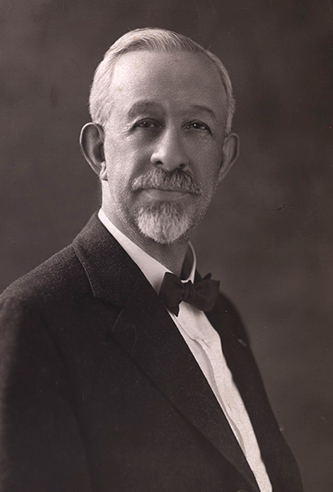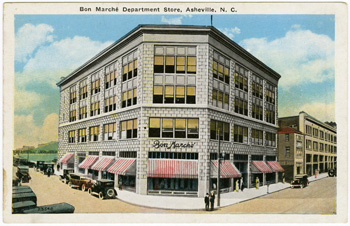Lipinsky, Solomon
By Brittney Garcia, North Carolina State University, 2013
February 23, 1856-1925
 Solomon Lipinsky was a civic leader and prominent Jewish businessman in Buncombe County. He was known for his community leadership and involvement and as the owner of one of the largest department stores in all of North Carolina. He is credited with being one of the men that shaped the economic boom in Asheville during the 1900s.
Solomon Lipinsky was a civic leader and prominent Jewish businessman in Buncombe County. He was known for his community leadership and involvement and as the owner of one of the largest department stores in all of North Carolina. He is credited with being one of the men that shaped the economic boom in Asheville during the 1900s.
Solomon Lipinsky was born in Richmond, Virginia, on February 23, 1856. At the age of 21, he moved to Tarboro, North Carolina where he met and married Eva Whitlock. After four years in Tarboro, Lipinsky moved to Asheville where he began working as a clerk at local store owned by his brother-in-law, Solomon Whitlock. By the time he was 31, Lipinsky owned a store, Lipinsky and Ellick, with his half-sister, Eva Ellick. It was a small store designed to provide dry goods to the citizens of Asheville. The year 1911 marked an economic boom for Asheville. During this time, Lipinsky and Ellick grew into the store Bon Marché and moved to a new location on Patton Avenue where it remained for 11 years. The store continued to grow and eventually moved to Haywood Street in downtown Asheville. During his lifetime, Lipinsky also opened other Bon Marché locations in Charlotte; Wilmington; and Columbia, South Carolina.
What started out as a small dry goods store became one of North Carolina’s finest and largest department stores. It did not take long for Bon Marché to become an attraction to Asheville citizens, especially since it had four floors equipped with everything from clothing to rugs and supplies. The store was tastefully decorated with mahogany cases and was one of the first public places in North Carolina to use hydraulic elevators. Bon Marché was an Asheville landmark for 90 years.
Bon Marché also sponsored daily radio broadcasts and held events such as visits from famous designers and make-up artists. These events encouraged community involvement in the department store. Lipinsky also offered training to his employees and started a small training school to make sure that his employees would succeed. Bon Marche was a family enterprise, and most of the Bon Marché locations were managed by his sons.
In addition to being involved in the economic development of the city of Asheville, Lipinsky was also involved in the community as a civic leader. He was a member of the Knights of Pythias, the Masons, and Odd Fellows, performing humanitarian projects through these organizations. He showed hosted an awards ceremony on behalf of Bon Marché to thank those that gave back to the community. Lipinsky served as Director of the National Bank of Commerce, president of the local Institutional Service Committee, and became an important presence in the Jewish community as a founding member of the Congregation Beth HaTephila.
 During the 1900s, the Jewish community was faced with whether to adopt Reform Judaism and integrate Jewish traditions with modern innovations. Many of the members of this congregation believed that they should adapt modern ways and did so by purchasing an organ which was prohibited at the time. Other members of the congregation were against modernizing which created a divide within the Jewish community. Lipinsky was as an advocate for Reform Judaism and stressed the importance of modernizing some aspects of Jewish traditions so that their children would better relate to the Jewish community. Many listened to him, and Reform Judaism continued within the congregation. During his time with Congregation Beth HaTephila, Lipinsky served as lay-leader, treasurer and eventually became President for the Congregation, which were influential and respected positions among the Jewish community.
During the 1900s, the Jewish community was faced with whether to adopt Reform Judaism and integrate Jewish traditions with modern innovations. Many of the members of this congregation believed that they should adapt modern ways and did so by purchasing an organ which was prohibited at the time. Other members of the congregation were against modernizing which created a divide within the Jewish community. Lipinsky was as an advocate for Reform Judaism and stressed the importance of modernizing some aspects of Jewish traditions so that their children would better relate to the Jewish community. Many listened to him, and Reform Judaism continued within the congregation. During his time with Congregation Beth HaTephila, Lipinsky served as lay-leader, treasurer and eventually became President for the Congregation, which were influential and respected positions among the Jewish community.
Lipinsky and his wife had three sons, Morris, Louis, and Whitlock, and a daughter, Clara. Bon Marché stayed in the Lipinsky family for three generations. Lipinsky died in 1925 and his wife followed in 1926. Newspapers announcing his death expressed the important role Lipinsky played in the community as a “beloved citizen”, and “one of the city’s best business men”. His children followed in his footsteps by becoming prominent leaders in their community. His son Louis made a tremendous impact in the education system and Lipinsky Hall at the University of North Carolina at Asheville is named after him.
Lipinsky was a man of principle, determined to leave a positive impact on the community and its citizens. He was involved in many aspects of Asheville's community and was dedicated to each organization and position he held. His obituary read: “Asheville has had few citizens who have been held in greater affection than Mr. Lipinsky. His kindness and courtesy, his unfailing consideration for others, made him one of the most beloved of Asheville citizens.”
References:
“WNC's 50 Most Influential People, Past & Present” WNC Magazine. https://wncmagazine.com/feature/wnc_s_50_most_influential_people_past_present (accessed November 7, 2014).
Lipinsky Family Collection. D.H. Ramsey Library, Special Collections. University of North Carolina Asheville. Last modified August 07, 2005. http://toto.lib.unca.edu/findingaids/mss/lipinsky/default_lipinsky.html (accessed October 20, 2013).
“Asheville, North Carolina” Encyclopedia of Southern Jewish Communities. Goldring-Woldenberg Institute of Southern Jewish Life. Last modified 2006, https://www.isjl.org/north-carolina-asheville-encyclopedia.html (accessed October 25, 2013).
Exhibit “The Family Store: A History of Jewish Businesses in Downtown Asheville, 1800-1900.” City Seeds, Inc., and History@Hand. http://www.history-at-hand.com/wp-content/uploads/2012/11/BonMarche_web.pdf (accessed October 25, 2013).
Greenberg, Sue, and Jan Kahn, Asheville: A Postcard History. Arcadia Publishing. 1999. 75-76. http://books.google.com/books?id=KboKUgB5TbEC&pg=PA75#v=onepage&q&f=false (accessed October 25, 2013).
Additional Resources:
Fahrer, Sharon, and Jan Schochet. “The Family Store: Bon Marche.” Montford 11, no. 9. (September 2006). 1.
Congregation Beth Ha-Tephila. The Golden Book of Memoirs: Fiftieth Anniversary of Congregation Beth Ha-Tephila. Asheville, N.C. August 1941. 12. http://toto.lib.unca.edu/booklets/golden_book_memoirs/default_golden_book_memoirs.htm (accessed February 25, 2014).
Image Credits:
"Solomon Lipinsky, n.d." I.D. # lip0020. Photograph. Folder 4, Box M2006.1.1. Series 6-11: Family Photographs, Lipinsky Family Collection. D.H. Ramsey Library Special Collections, University of North Carolina Asheville 28804. http://toto.lib.unca.edu/findingaids/mss/lipinsky/series/photographs_lipinsky.htm (accessed March 12, 2014).
"Bon Marche Department Store, Asheville, NC" in Durwood Barbour Collection of North Carolina Postcards (P077), North Carolina Collection Photographic Archives, Wilson Library, UNC-Chapel Hill. http://dc.lib.unc.edu/cdm/ref/collection/nc_post/id/7820 (accessed February 26, 2014).
15 November 2013 | Garcia, Brittney